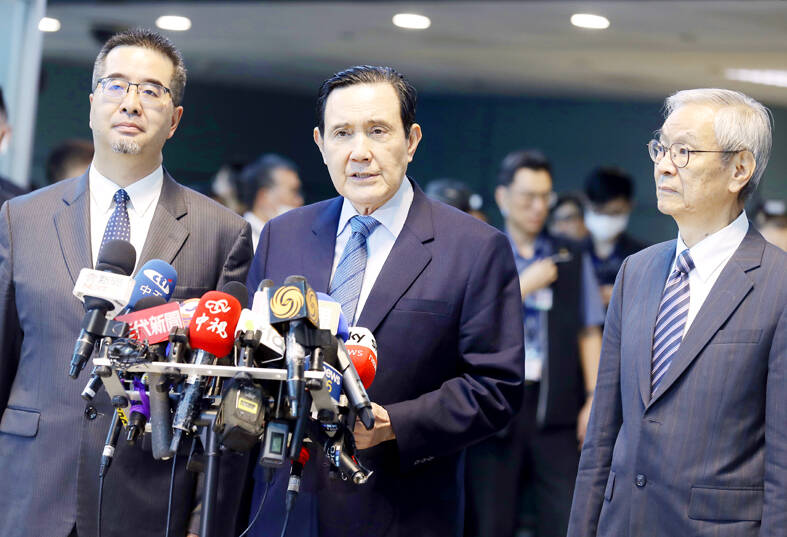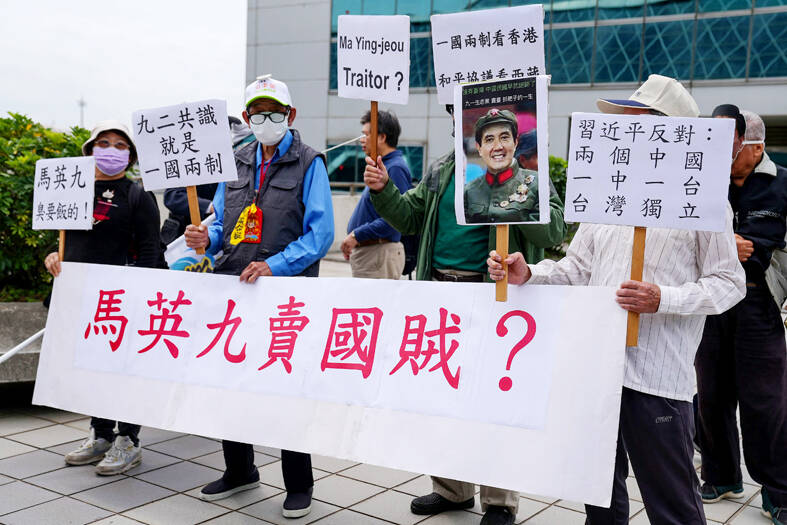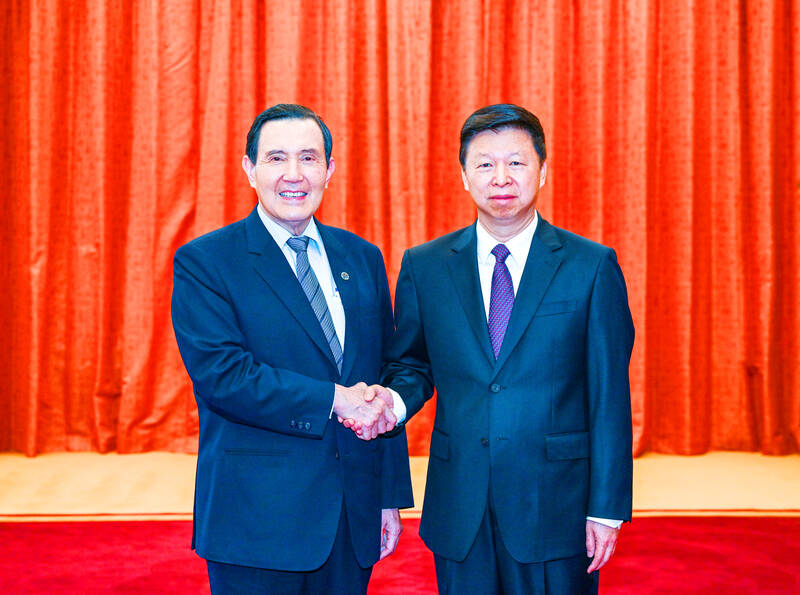Former president Ma Ying-jeou (馬英九) yesterday arrived in China with a student delegation on an 11-day trip, which he said would deliver a message of friendship and peace.
Unlike his visit to China last year, this time he plans to stop in Beijing, which has sparked speculation that he could meet with Chinese President Xi Jinping (習近平). Reuters has reported that such a meeting is to take place on Monday next week.
Speaking to reporters before boarding his flight at Taiwan Taoyuan International Airport, Ma said that amid current cross-strait tensions, he would try to convey Taiwanese’s love of peace, and voice hope that the two sides can increase exchanges and avoid war.

Photo: Chiang Ying-ying, AP
“This is a trip of peace and a trip of friendship,” he said.
Having left the presidency eight years ago, and holding no government or political office, “I can only do my best as an individual to promote cross-strait student exchanges, and help reduce enmity and build goodwill between the two sides’ people,” Ma said.
Last week, the Ma Ying-jeou Foundation said that the former president would lead a group of 20 students on a trip to China until Thursday next week.

Photo: Zhao Yan, AFP
The visit is to include meetings with Chinese students, company tours, and trips to sites of historical or cultural significance, it said.
Ma met with China’s Taiwan Affairs Office Director Song Tao (宋濤) shortly after arriving in Shenzhen yesterday.
Song relayed a “kind regard to Mr Ma” on Xi’s behalf, while Ma in response said he could feel that between the two sides of the Taiwan Strait “blood is thicker than water.”

Photo courtesy of Ma’s office via CNA
Ma added that peace and stability are needed in cross-strait relations to ensure the well-being of the people on both sides.
The delegation is to spend three days in Guangdong Province, before traveling to Shaanxi Province tomorrow night and Beijing on Sunday, the foundation said.
Ma, who was president from 2008 to 2016, held a historic meeting with Xi in Singapore in 2015, the first gathering of leaders from the two sides of the Taiwan Strait since the Chinese Civil War in 1949.
Asked last week about the possibility of another such meeting, foundation director Hsiao Hsu-tsen (蕭旭岑) said that Ma hopes there will be an opportunity to “see an old friend,” but would leave the exact arrangements up to the Chinese side, as they are his hosts.
Commenting on Ma’s visit, Kuo Yu-jen (郭育仁), a professor at the Institute of China and Asia-Pacific Studies at National Sun Yat-sen University, said that to the Chinese Communist Party (CCP), Ma is working right into its “united front” strategy targeting Taiwan.
The Taiwan Statebuilding Party also criticized Ma in a news conference in Taipei yesterday, saying that the former president no longer has the mandate of voters and is now a mouthpiece of the CCP.
Additional reporting by Chen Yu-fu

US President Donald Trump yesterday announced sweeping "reciprocal tariffs" on US trading partners, including a 32 percent tax on goods from Taiwan that is set to take effect on Wednesday. At a Rose Garden event, Trump declared a 10 percent baseline tax on imports from all countries, with the White House saying it would take effect on Saturday. Countries with larger trade surpluses with the US would face higher duties beginning on Wednesday, including Taiwan (32 percent), China (34 percent), Japan (24 percent), South Korea (25 percent), Vietnam (46 percent) and Thailand (36 percent). Canada and Mexico, the two largest US trading

China's military today said it began joint army, navy and rocket force exercises around Taiwan to "serve as a stern warning and powerful deterrent against Taiwanese independence," calling President William Lai (賴清德) a "parasite." The exercises come after Lai called Beijing a "foreign hostile force" last month. More than 10 Chinese military ships approached close to Taiwan's 24 nautical mile (44.4km) contiguous zone this morning and Taiwan sent its own warships to respond, two senior Taiwanese officials said. Taiwan has not yet detected any live fire by the Chinese military so far, one of the officials said. The drills took place after US Secretary

CHIP EXCEPTION: An official said that an exception for Taiwanese semiconductors would have a limited effect, as most are packaged in third nations before being sold The Executive Yuan yesterday decried US President Donald Trump’s 32 percent tariff on Taiwanese goods announced hours earlier as “unfair,” saying it would lodge a representation with Washington. The Cabinet in a statement described the pledged US tariffs, expected to take effect on Wednesday next week, as “deeply unreasonable” and “highly regrettable.” Cabinet spokeswoman Michelle Lee (李慧芝) said that the government would “lodge a solemn representation” with the US Trade Representative and continue negotiating with Washington to “ensure the interests of our nation and industries.” Trump at a news conference in Washington on Wednesday announced a 10 percent baseline tariff on most goods

THUGGISH BEHAVIOR: Encouraging people to report independence supporters is another intimidation tactic that threatens cross-strait peace, the state department said China setting up an online system for reporting “Taiwanese independence” advocates is an “irresponsible and reprehensible” act, a US government spokesperson said on Friday. “China’s call for private individuals to report on alleged ‘persecution or suppression’ by supposed ‘Taiwan independence henchmen and accomplices’ is irresponsible and reprehensible,” an unnamed US Department of State spokesperson told the Central News Agency in an e-mail. The move is part of Beijing’s “intimidation campaign” against Taiwan and its supporters, and is “threatening free speech around the world, destabilizing the Indo-Pacific region, and deliberately eroding the cross-strait status quo,” the spokesperson said. The Chinese Communist Party’s “threats